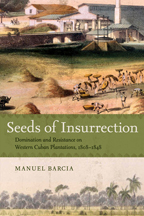
232 pages / 6.00 x 9.00 inches / 8 Halftones
History / Latin America & Caribbean
On a late September day in 1837, shortly after sunset, a group of six slaves marched into the small Cuban village of Güirade Melena, beating African drums and singing loudly. Alarmed, villagers rushed into the streets with machetes, sabers, and spears, ready to take action against the disobedient slaves. Yet this makeshift parade never evolved into the violent rebellion the villagers expected. Though the slaves who lived on Cuban coffee and sugar plantations sometimes defied their captors by orchestrating fierce uprisings and committing murder and suicide, they also resisted in less overt ways--by running away, feigning sickness, breaking tools, and by maintaining their own cultures. In Seeds of Insurrection, Manuel Barcia examines many largely overlooked ways in which African and Creole slaves in Cuba defied domination in the first half of the nineteenth century.
Ethnic and geographic origins, as well as slaves' personal experiences, affected their resistance to bondage. Dividing resistance into two broad types--violent and nonviolent--Barcia examines when and why the slaves chose certain forms. Creole slaves grew up in Cuba, for example, so they learned both the language of their ancestors and Spanish, and they came to understand their Spanish masters as few African-born slaves ever could. Consequently, they cleverly used the few rights colonial laws offered them to their advantage. African-born slaves, by contrast, carried with them their memories from home, their religious beliefs, jokes, and songs, and they dealt with enslavement by incorporating this cultural heritage into their everyday activities. Barcia demonstrates the ways in which the slaves made use of the privacy of their huts and barracks and the lack of surveillance in the fields to voice their ideas and opinions--through song, religion, gossip, folktales, and jokes--within an acceptable degree of safety.
Relying primarily on transcripts of local and central court proceedings involving slaves, free people of color, slave owners, and witnesses, Barcia reveals the slaves' view of their world. He also explores the forms of domination practiced by colonial authorities, plantation masters, and overseers, gleaning insight from innovative sources, including medical reports and diaries of rancheadores, as well as public and private correspondence, newspapers, and the contributions of contemporary scholars.
In Seeds of Insurrection, Barcia expands the definition of resistance and adds an invaluable dimension to the understanding of slavery in the Americas.
Manuel Barcia is a senior lecturer in Latin American studies at the University of Leeds. He is also an Honorary Fellow at the Wilberforce Institute for the Study of Slavery and Emancipation at the University of Hull, and the author of Seeds of Insurrection: Domination and Resistance on Western Cuban Plantations, 1808-1848.
“.”—
"Seeds of Insurrection [offers] a considerable contribution to historians’ growing awareness of the importance of African slaves’ previous experience and culture in the shaping of American slavery and resistance. Manuel Barcia has done a fine work of archival research that brings Cuba’s plantation slaves into the broader picture of American slave resistance in the first half of the nineteenth century."—Aline Helg, Slavery & Abolition
"All in all, Barcia’s book offers a refreshing new look at African/black agency in the western Cuban plantation world. Its suggests that while bozales might have operated on the basis of some West African influences carried over to the New World, they did so in a Cuban environment that required making adjustments."—Jorge L. Chinea, Journal of Latin American Studies
"Barcia’s work points scholars in several directions. Indeed, one of the strengths of this work lies in the many gems found within its pages that can be developed into a number of studies."—Jose Ortega, The Americas
"In Seeds of Insurrection, Barcia successfully expands our understanding of the nature of resistance with which slaves responded to oppression in the nineteenth century."—Matthew A. Redinger, Ethnohistory
"In the context of the massive demographic transformation of nineteenth-century Cuban slavery, scholars will likely heed Barcia's call for its overwhelming salience."—Anne Eller, Social History
"Manuel Barcia's Seeds of Insurrection is a pioneering study in arguing for day-to-day resistance as the central feature of the Cuban slave experience....His attention to African cultural practices and experiences of the enslaved makes this a valuable contribution to the rapidly burgeoning literature of the African Diaspora. Scholars of Latin American and Caribbean slavery will need to make room on their bookshelves for this important volume and its findings will make for fruitful discussion in graduate seminars."—Matt D. Childs, New West Indian Guide
Found an Error? Tell us about it.